CLAS Doctoral Students Take Top Spots in 3MT Contest
For decades, the color blue has been a significant focus of research into improvements in digital display technology. The images seen on laptops, phones and flat-screen TVs come from light-emitting materials comprising three colors: red, green and blue.
“The colors red and green are very easy to obtain, but the color blue has been the bane of display technology. My research is focused on creating a new class of blue-emitting materials to make these displays more energy efficient, cost effective and environmentally friendly,” said Abhishek Shibu, a Ph.D. candidate in Nanoscale Science. He won first place and the People’s Choice Award for the presentation “Let There Be ‘BLUE’ Light” at UNC Charlotte’s Three Minute Thesis (3MT) competition.
He and the second- and third-place winners are doctoral students in the College of Liberal Arts & Sciences.
The Walter Research Group in the Department of Chemistry has created a library of crystals in the quest to improve the blue, which, Shibu says, “will be paradigm-shifting candidates in the world of display technology.”
The Three Minute Thesis competition helps prepare graduate students to communicate for success in their chosen careers. Students who participate in the 3MT have an opportunity to receive personal coaching and instruction on public presentations through the Center for Graduate Life. The center’s course, Communicating Your Research to a Non-Expert Audience, is tailored to help students communicate about their research with varied audiences.
Nicole Stott, a Ph.D. student in Biological Sciences with a concentration in Cellular and Molecular Biology, placed second for “Lung Cancer Progression.”
Stott’s research assesses how the drug Metformin, commonly used to treat diabetes, also can reduce lung cancer tumor burden while maintaining skeletal muscle health. Stott’s work holds promise for improving the welfare and recovery time for lung cancer patients.
Mukulika Bose, also a Ph.D. student in Biological Sciences, received the third place award for “Targeting Pancreatic Cancer with a Specific Antibody.”
Current treatment for pancreatic cancer often kills normal cells as well as the tumor. Bose’s research focuses on identifying biomarkers of cancerous cells to better target treatment.
Learn more about the origins of the 3MT Competitions here. In the image, Abhishek Shibu presents his research.
Researchers Propose Important Link Between Microbial Infections and Cancers
It is generally known that viruses, with their cell-invading capabilities, can be responsible for a number of different cancers. What is less broadly discussed are the cancer-causing capabilities of bacteria, or the processes by which they may cause malignancy.
In a review article appearing in the November 18, 2019 issue of Trends in Molecular Medicine, University of North Carolina at Charlotte cancer biologists Pinku Mukherjee and Mukulika Bose discuss a mechanism that, they suggest, may implicate bacterial infections in a wide variety of cancers. This is a cause that science has yet to fully understand.
The article, “Microbe – MUC1 Crosstalk in Cancer-Associated Infections,” makes the case for the likely implication of microbial — especially bacterial — interactions with the glycoprotein known as MUC1 in cancers involving epithelial cells, including cancers of the colon, lungs, stomach, liver and pancreas.
Epithelial cells are cells that are frequently specialized for absorption or secretion purposes, and to form linings or barriers in organs, including the intestines, lungs, stomach, liver and reproductive organs.
MUC1 is a “transmembrane” protein – extending outside, through and inside the cell membrane to the cytoplasm – and is present in nearly all glandular epithelial cells. It is one of a group of proteins known as “mucins” for their involvement in protective mucous layers, whose gel-forming features are caused by sugar molecules coating part of the protein’s length (“glycosolation”). The sugars, essentially, interact with water molecules, creating a slippery, slimy barrier, protecting cell layers against pathogens and environmental damage.
Mukherjee, Irwin Belk Distinguished Professor of Cancer Research and chair of UNC Charlotte’s Department of Biological Sciences in the College of Liberal Arts & Sciences, has done considerable past research on the surprisingly negative roles MUC1 can play in a variety of cancers. The association of the protein with cancer is very strong. As the article notes, “the National Cancer Institute ranked MUC1 as the second best target antigen for the development of cancer vaccines.”
Mukherjee also does work on the interaction of cancer and pathogen infections. “Now it is known that about 20% of all malignancies, especially epithelial malignancies, are associated with some sort of infection, viral or bacterial, persistent inflammation being the root cause” she noted.
Mukherjee explained that a lot is now known about viruses and the biological mechanisms involved, such as the association of HPV with cervical cancer, for example.
“But there is very little known about what causes cancers associated with bacterial infections… not much is known about this. But when there are bacterial infections that have definitely been linked to cancer — like H. pylori with stomach cancer and ulcers — that appears to have to do with the basic persistence of the bacteria,” she said.
Persistent infections may be different because of the effects of their long-term attacks on cellular defense mechanisms.
“But if these persistent bacterial infections cause aberrations on the epithelial layers, mucins must be involved because every glandular epithelial cell has mucins and we know that mucins are the first protective layer in any bacterial infection,” she said.
Imbedded in the epithelial cell membrane, with its outside end coated with attached sugars and its inside end floating largely naked in the cell’s cytoplasm, MUC1 serves a largely protective role, Mukherjee said. Molecules on the surface of bacterial cells bind to the mucosal layer or to the glycosolated end of MUC1, but the cell is ready for the attack and responds.
“Attachment by the bacteria triggers MUC1 to shed its extracellular domain (the glycosolated section) with the bacteria attached, and the whole thing goes to the mucous layer, where the bacteria is removed,” she said. “It thus works as an anti-inflammatory by pushing the attacking bacteria out and engulfing it into the sugary molecule.”
However, the process can have side-effect, she said. “That’s mainly how MUC1 works, but what happens sometimes when MUC1 sheds, its remaining outside and cytoplasmic tail (the protein’s inner segment) gets activated. A persistent bacterial barrage on a cell activates some cytoplasmic tail and we know that when the cytoplasmic tail is activated it can trigger signaling pathways that cause cancer.”
MUC1 can thus play a dual role during infection, either being anti-inflammatory by staving off bacterial attack, or pro-inflammatory, triggering inflammation processes, which, in turn, can cause malignancy.
“The dual role of MUC1 as protective and oncogenic in the presence of microbial infection is, in a nutshell, what this article is about,” she said. “There are pieces of research out there that point to this, but we are trying to pull them together.”
The article surveys studies on a dozen common infections by bacteria and viruses that are known to involve MUC1 and notes a limited number of examples where the protein is known to play a pro-inflammatory role.
“The field has only looked at these mechanisms in small number of infection-associated cancers, and even fewer where bacteria are involved,” Mukherjee noted. “We hope our hypothesis leads to people looking at this in a more scientific manner.”
Mukherjee’s hypothesis stresses the central role of MUC1 and mucins in targeting future research. Because of strong connections between the protein and cancer processes in epithelial cells and the protein’s strong involvement in combating microbial infections, it is an obvious, yet understudied connection between infection and cancer.
“The idea is that at some point we are going to have to start studying mucins more seriously,” she said. “Rather than only studying mucins in already transformed cancer cells, we need to be studying them before the cells transform and see what is going on. The work being done on the cancer side needs to be connected with the work on the bacterial side, and the role of infection in triggering inflammation.
Mukherjee’s research is supported by grants from the National Cancer Institute, Department of Defense, Susan G. Komen Foundation, and the Pancreatic Cancer Action Network/American Association of Cancer Research. Her co-author, Bose, is a doctoral student who does research in Mukherjee’s lab.
Words: James Hathaway | Images: Courtesy of Mukherjee (shown on the left) and Bose.
Webb Receives Teaching Award; Other College Faculty Named As Finalists
Jennifer Webb of the Department of Psychological Science is the 2019 recipient of the Bank of America Award for Teaching Excellence. Each fall, through the University Teaching Excellence Awards, UNC Charlotte recognizes faculty members who are exemplary educators.
“Dr. Webb has demonstrated a strong commitment to teaching and has proven to be an outstanding classroom instructor,” said Eric Heggestad, associate professor and chair of the Department of Psychological Science. “She is widely regarded as a passionate, caring and knowledgeable instructor who is exceedingly skilled at sharing her knowledge with students in a way that they can fully grasp and, in fact, get excited about.”
Thomas Marshall, a lecturer in Risk Management and Insurance, received the inaugural UNC Charlotte Award for Teaching Excellence.
From the College of Liberal Arts & Sciences, three other faculty also were honored as finalists for the University’s two teaching awards during the university’s celebration ceremony on Friday, Sept. 6, at the Hilton Center City.
For the Bank of America Award for Teaching Excellence award, finalists are Jordan Poler, professor, Chemistry; and James Franki, associate professor, Art and Art History. For the new UNC Charlotte Teaching Excellence Award, the two finalists both come from the College of Liberal Arts & Sciences. They are Oscar Lansen, teaching professor, History; and Terry Shirley Jr., senior lecturer, Geography and Earth Sciences.
Webb, an associate professor in the Department of Psychological Science, joined UNC Charlotte in 2007. She has taught eight courses in the psychology undergraduate program and four courses for the health psychology doctoral program. Additionally, she developed two new courses for the undergraduate major.
When engaging with students, Webb strives for respect, fairness, transparency and authenticity. She considers her classroom a space where students are co-creators in the process of learning with the goal of enhancing student motivation and learning.
“I do not believe in lecturing at students. I view the classroom as a creative space for our collective wisdom to dynamically unfold through lively exchanges in which we can comfortably debate the merits of multiple sides of an issue. Engaging this critical lens supports students’ consciousness-raising capacities and cognitive flexibility as personal resources.”
— Jennifer Webb
She also uses group projects and assignments around community engagement and advocacy themes to “advance students’ ability to synergize their collective personal strengths in a meaningful way to help strengthen campus or community resources.”
The Bank of America Award for Teaching Excellence, first presented in 1968, is given to a full-time, tenured faculty member with at least seven years of service to UNC Charlotte.
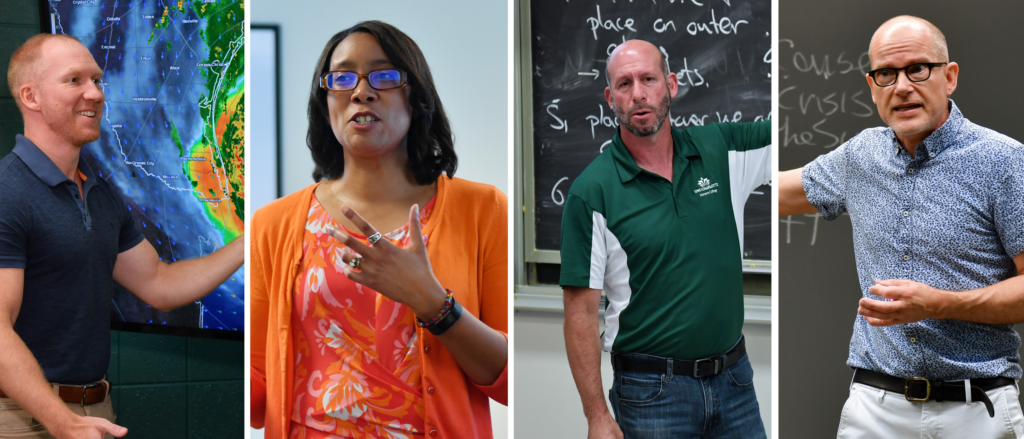
Finalists Share Teaching Philosophies
Poler said even after 24 years teaching chemistry, “I love watching all the furrowed brows become raised, with widened eyes.”
Connecting with his students is important to Poler. He developed a “Pledge of Allegiance” method to check in with students, by asking multiple choice queries that students can answer by holding that number of fingers to their chest.
“It is private, but not anonymous, since I can connect with them directly, even in the back row,” he said.
Recognizing that inexperienced students need more resources to be successful, for the past eight years Poler has offered a weeklong boot camp for rising first-year students called, “Summer Intensive Chemistry Orientation.” This camp helps improve student success, increase retention, lower withdrawal rates and improve overall GPAs.
Lansen has witnessed how societal and structural changes present challenges for today’s undergraduates, and he seeks to countermand that by employing classroom innovations such as experiential didactics, visuals-spatial modeling, collaborative teaching and specialized course design, in order to develop students’ analytical and expressive skills. As a testament to his professional excellence, Lansen has received eight teaching awards during his time at UNC Charlotte.
“I love to teach: to awaken critical inquiry and equip young minds with the essential skills for meaningful action in life and work,” said Lansen. He seeks to engage students in learning by developing course themes and foci that are inclusive of and relevant to the diverse backgrounds of his students. In some courses, he has students view the content through the eyes and action of their historical peers.
Shirley is widely known for his enthusiasm for meteorology, and he wants to share that passion with others.
“Getting someone excited to learn, to grow as a person, to embrace diversity, to problem solve, to ask ‘Why?’, and to effectively communicate is what I center my career around,” said Shirley.
During his 13 years at UNC Charlotte, Shirley has developed two general education electives and several upper division bachelor’s courses. He also developed and delivered one of the department’s first online courses. In addition, Terry is the department’s faculty fellow for LEADS, a transdisciplinary career preparation program, and was elected to the University’s Faculty Integrity Board. He also serves on the Undergraduate Curriculum Committee.
The new UNC Charlotte Award for Teaching Excellence is open to full- or part-time non-tenure track faculty members who have at least five years of teaching service at UNC Charlotte (lecturers and adjunct faculty). Eligibility for the Bank of America Award for Teaching Excellence, first presented in 1968, continues to be for full-time, tenured faculty members with at least seven years of service to UNC Charlotte.
Community Seeks Renewal In Botanical Gardens Following Tragedy
Community members have sought solace in the UNC Charlotte Botanical Gardens after the tragic events of April 30, when an individual opened fire in a UNC Charlotte classroom, killing two students and injuring four others. The visitors found a humble table at the entrance to the Susie Harwood Gardens. There, stacked, were smooth gray, white and brown stones and black markers for people to leave messages, artwork, memories, and prayers.
Over the following weeks, the stones were tucked along the Botanical Gardens’ paths, sending their messages forward in a collective way. The Botanical Gardens staff have now gathered and stored the stones, which will be used in a more permanent commemoration in the future.
“Like the rest of campus, we are all deeply troubled by what happened and wanted to do something besides just being here,” Botanical Gardens Director Jeff Gillman says. “The remembrance stones were our answer, and we are happy that we can be a part of the healing process.”
Individuals and groups came to the Botanical Gardens to find refuge and to connect. Deborah Thomas, chair of the Department of Geography and Earth Sciences, emailed and invited class members to join together in the Botanical Gardens for an informal and optional meeting, she says.
“The Botanical Gardens were an important part of the healing process for me, for my class, and I am sure others,” Thomas says. “My class was in lockdown together the evening of the tragedy. Afterwards, although finals were optional and they had submitted much of their work, I thought it would be nice to offer an opportunity to get together on our finals night. Many of us met at the gazebo, had a casual dialog about class, and chatted about the upcoming summer.” Several students also left stones along the path and told her the activity was calming and touching.
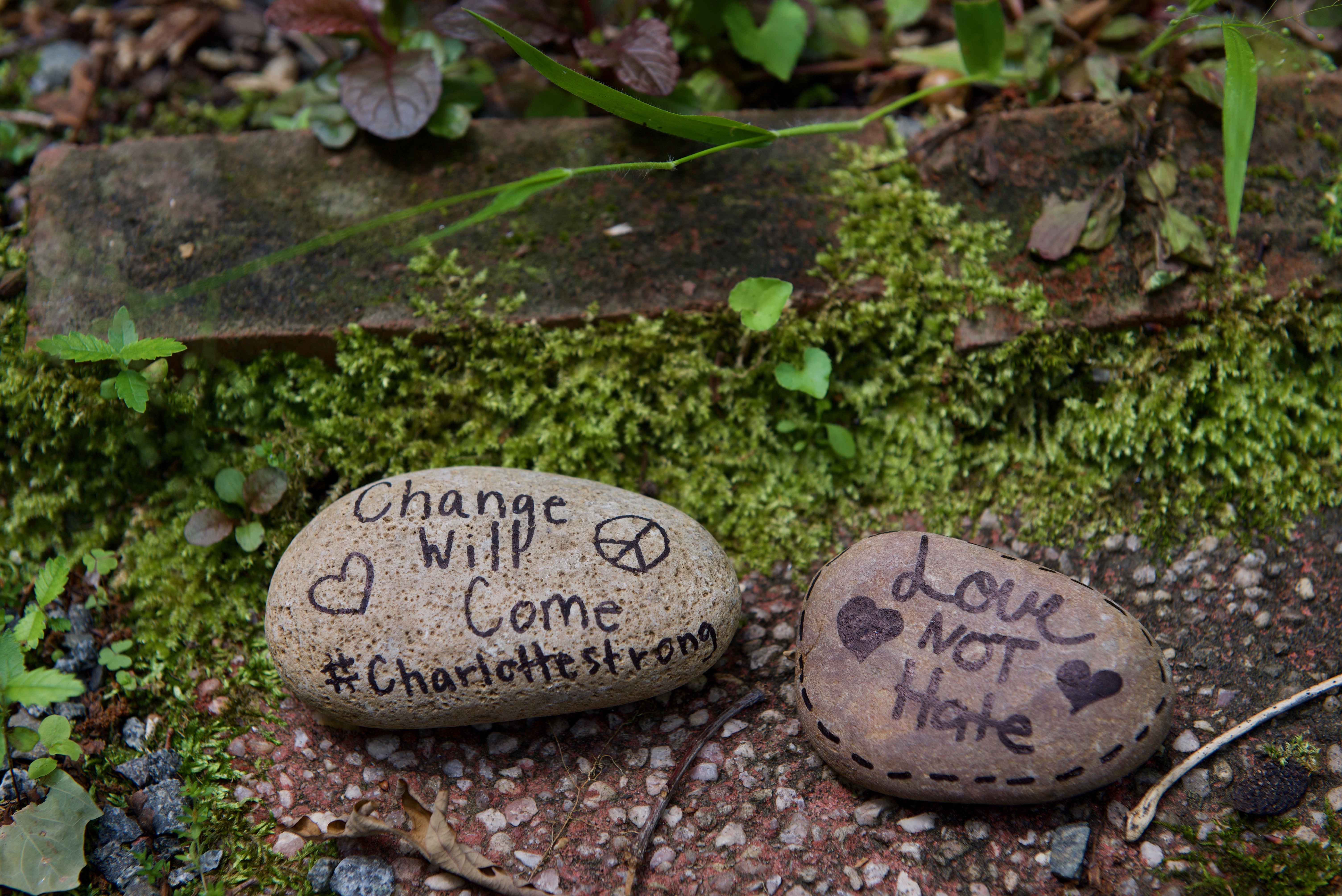
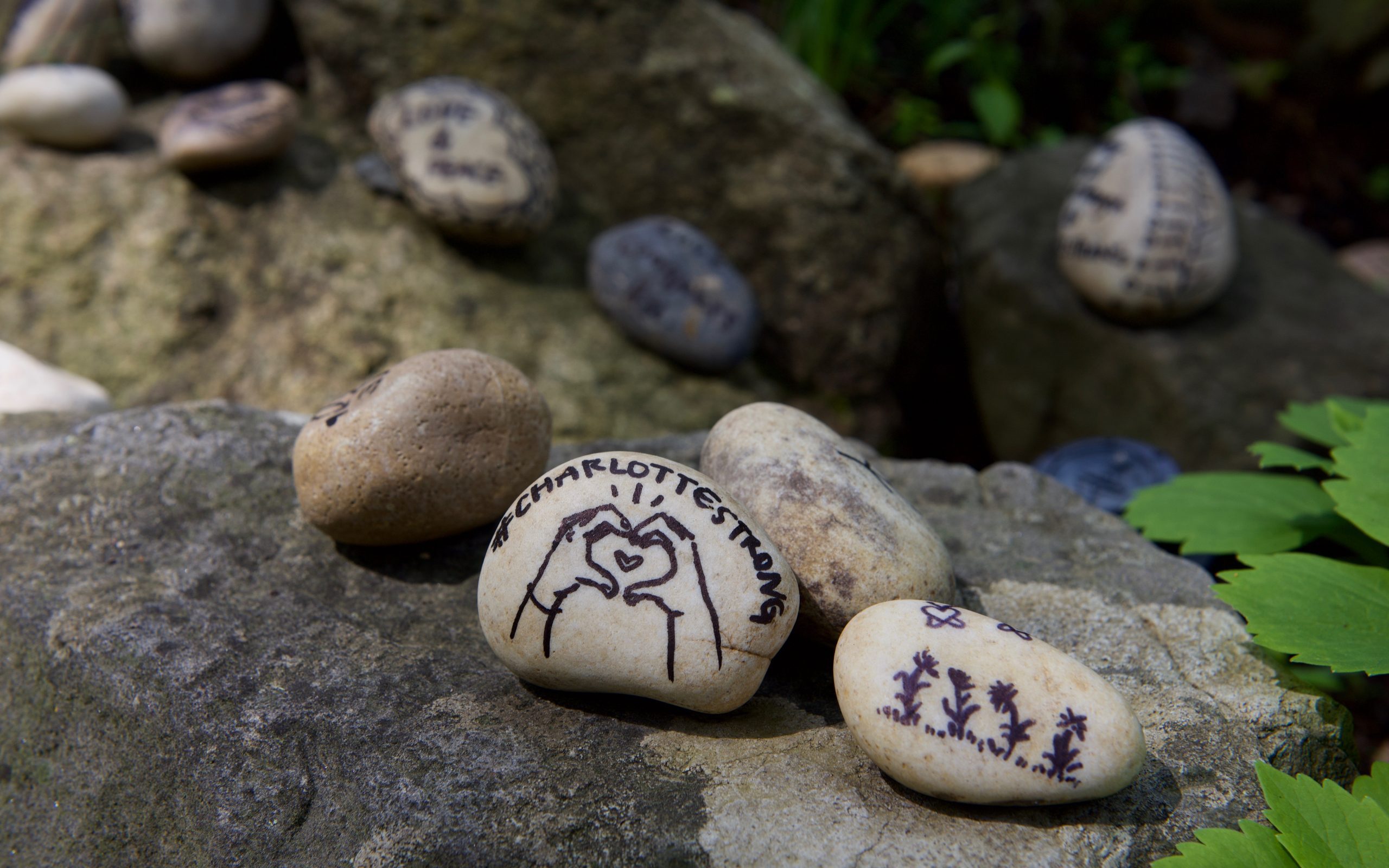
Assistant Director Amy Tipton provides more insights into how the concept came about and how the community reacted.
What led to this idea?
We had originally planned a spring concert and festivities to celebrate May Day, to occur the day after the shootings. Given the circumstance and the joyous nature of the concert planned, we decided to cancel the concert. As a result, the staff had conversations about the different aspects of the Gardens. The Gardens offers a place of joy and beauty as well as a place of refuge and contemplation. We recognized that the Gardens have great potential for healing and wanted to organize a project to welcome the UNC Charlotte community to use the Gardens as a resource to assist with healing.
How did you decide to offer the stones as a remembrance concept?
We chose to use river stones as the medium for the interactive project, as many cultures around the world use stone(s) to memorialize people, mark events, and exhibit faith – such as tombstones, cairns, and inuksuk. In addition, we felt that the stones would provide a very personal and tactile experience – selecting “your” stone, feeling its weight and texture, contemplating text or an image, embellishing the stone, and placing it along a path. We worked out the details of the project over the course of the next few days, and started it on the Monday following the tragedy.
What are your hopes for the role of the Botanical Gardens as the UNC Charlotte community continues to process and grieve?
Envisioned as a very private, personal act, we found that the embellishment and placement of the stones unexpectedly created a larger experience of knowing that we are all part of a caring, united UNC Charlotte community. I personally found that in addition to the process of embellishing the stone, the act of walking through the Gardens to select a location to place it added to the healing experience. Finding so many others’ stones along the paths gave me a sense of how many individuals were affected by the tragedy. We hope that the Gardens can continue to contribute to the healing process.
Words: Amy Tipton, with Lynn Roberson | Images: Lynn Roberson
Doctoral Student Forms Bonds Through Chemistry, Dance
Margaret Kocherga’s Instagram comes alive through the vivid photos and videos she posts, illustrating her life as a student in the Nanoscale Science Ph.D. Program at UNC Charlotte.
Her posts show Kocherga conducting experiments, presenting at conferences on STEM topics, leading chemistry workshops with audiences of all ages, collaborating with colleagues, teaching college labs, slogging through late-night homework – and dancing.
She even occasionally shows up en pointe around campus wearing a lab coat – all in the interest of debunking stereotypes about scientists and artists.
While her social media posts illustrate diverse settings, activities and even wardrobe choices, a closer look reveals consistent threads. Her story is one of a young scientist and artist who is making connections and encouraging others; discovering and sharing knowledge; and keeping a sharp eye on a dizzying array of daily tasks.
One thing Kocherga emphasizes through her posts is that mistakes, rejections, and setbacks happen to us all.
“There is often a perfectionism stigma, in which people feel like things must be perfect,” she says. “It puts a lot of mental pressure on people, so that’s one thing I want to show, that not everything gets done. I want to show that there are a lot of things that work out well, such as in my research projects, and then some things don’t work, and I don’t get results for a month, and I’m frustrated.”
Perseverance and Versatility
For chemistry Professor Thomas Schmedake, who mentors Kocherga in his lab, her focus on pushing forward through adversity is a great strength.

“The two qualities I value most in Margaret as a scientist are her incredible perseverance and versatility,” Schmedake says “She has demonstrated an exceptional capacity for both, as she has propelled the development of our research program from the concept phase, through proof-of-concept, to the brink of commercialization.” Kocherga is a critical element in a research collaboration that has brought together:
- Synthesis and modeling breakthroughs from the Schmedake lab,
- Developments in organic electronic device fabrication from Michael Walter’s chemistry lab,
- Expertise in thin-film and device characterization and engineering from Yong Zhang’s lab in the Department of Electrical and Computer Engineering in The William States Lee College of Engineering, and
- Physics and optical science expertise from Tino Hofmann and others.
“Margaret is the truly exceptional graduate student who is able to leverage the expertise of these groups to achieve an interdisciplinary breakthrough in the field of organic electronics, which her recent manuscript in Chemical Communications highlights,” Schmedake says.
A dozen UNC Charlotte faculty and students from diverse disciplines are collaborators on the project and authors on the paper, with Kocherga as lead author. The team is synthesizing silicon complexes for electron transport and electroluminescence applications, to enhance operational lifetimes, increase device efficiency, and lower device costs.
One potential use for these stable, non-toxic, and lightweight materials is for bendable health-monitoring wearable devices. Use in cellular phones and computers are other potential applications.
“This was a significant research paper because we demonstrated we can make these new compounds, and we’ve shown the compounds can be applied in the area of light-emitting diodes,” Kocherga says. “We’ve shown that we can get a pixel that lights up and produces light.”
Kocherga is also a key member of a diverse interdisciplinary team that published a paper in August 2019 in the journal Optical Materials Express.
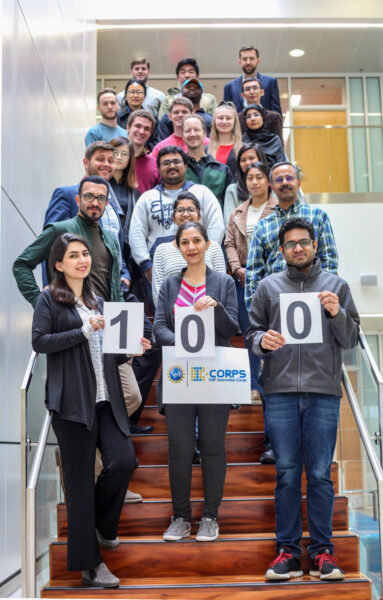
Life lately has been even more of a whirlwind for Kocherga. In one new initiative, she has participated in UNC Charlotte’s Ventureprise Launch NSF I-Corps program as an entrepreneurial lead, exploring the commercial viability of the team’s research. Kocherga conducted 70 interviews with potential customers, funders and competitors as part of the discovery process.
In another accomplishment, in May she received the award for best oral presentation by a student at the 50th North American Silicon Symposium in Columbia, S.C., and she took a first place at the UNC Charlotte Graduate Research Symposium. Earlier in 2019, she earned the Younger Chemists Committee Leadership Development Award from the American Chemical Society.
Engaging the Community
Along with her research, Kocherga takes time to engage the community in science. The National Science Foundation has supported her work with Schmedake and the Charlotte Teachers Institute to build the capacity of 8th grade science classroom teachers, students, and parents at James Martin Middle School.
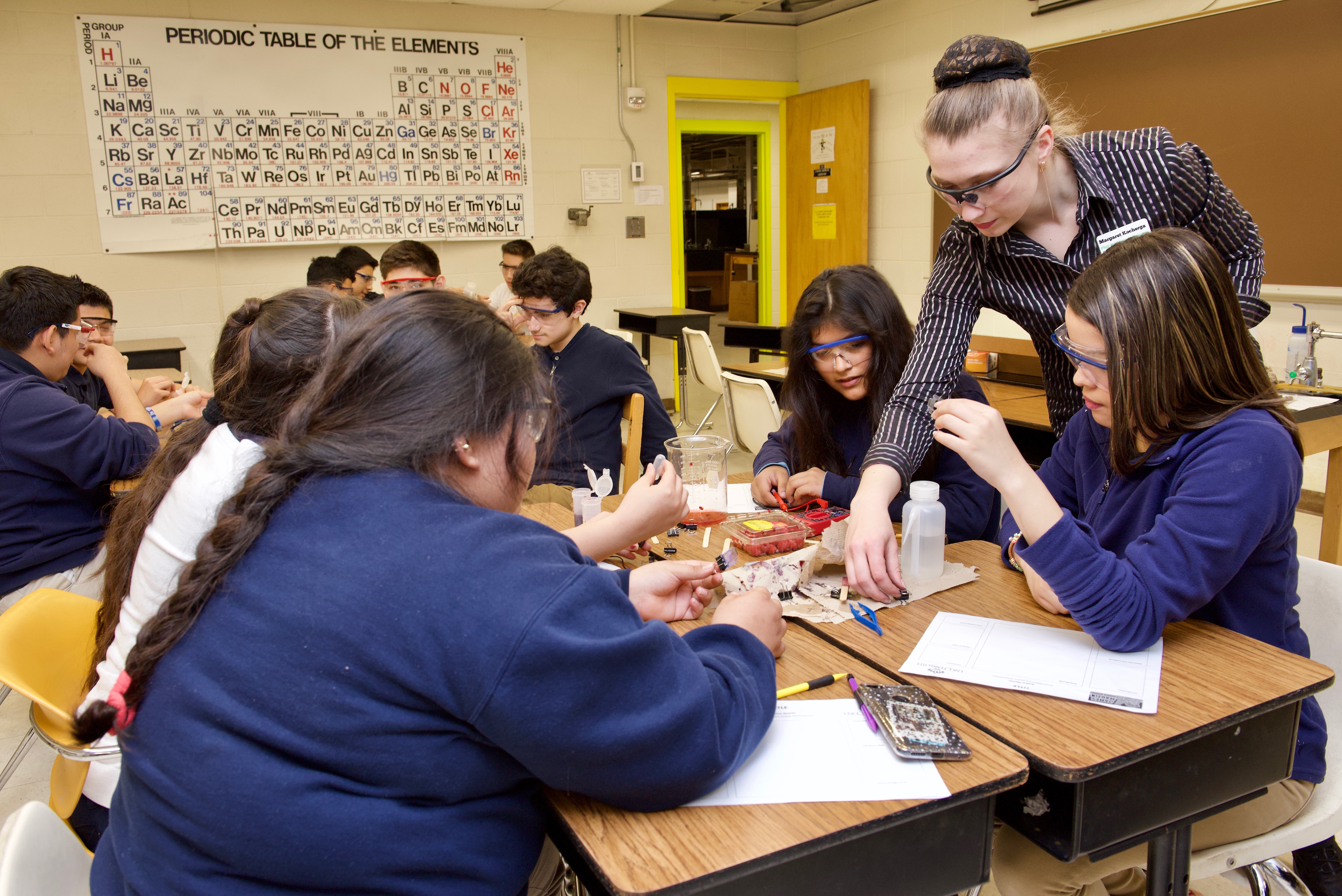
“Margaret recruited a team of volunteers at UNC Charlotte, including undergraduate and graduate students, to deliver hands-on science demonstrations at a parents’ night at the middle school,” says CTI Executive Director Scott Gartlan. “Margaret gave these parents and students a chance to experience science together in exciting, engaging ways. The students and teachers also visited UNC Charlotte labs to conduct experiments related to their 8th grade curriculum, and they started a first-ever science club at the school.” Kocherga and Schmedake spent time at the school as well.
Kocherga is a long-time leader with UNC Charlotte’s Science and Technology Expo, a public science event hosted by science and technology faculty, staff and students as part of the North Carolina Science Festival. Her popular Colors of Chemistry workshop gives children and families a chance to experience hands-on science.
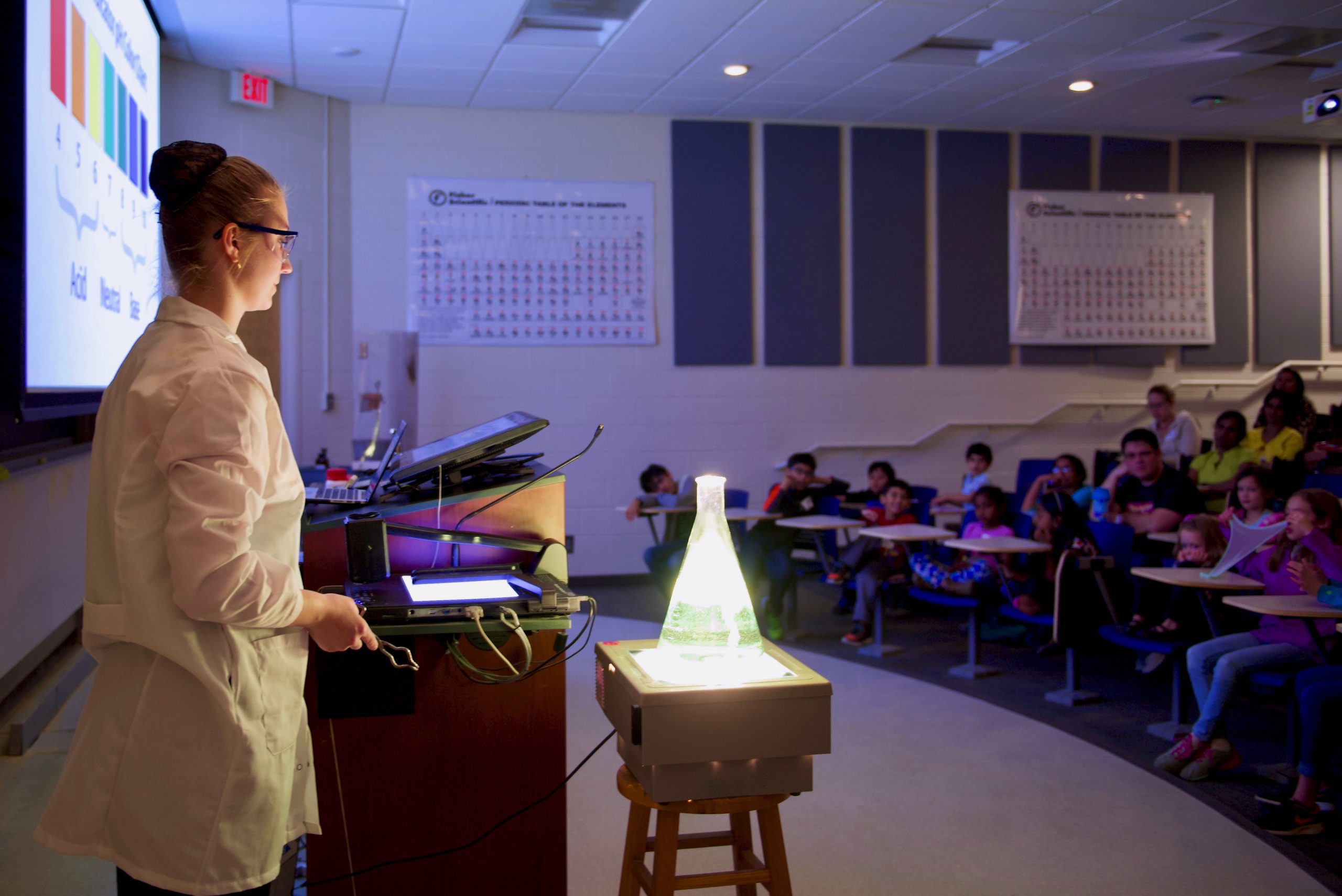
Shared Attributes
She also squeezes in time to dance and to teach dance, and she fields questions from students and parents about how science and the arts interrelate. The ability to deal with unexpected results and setbacks serves scientists and artists well, as do spontaneity, creativity, and communication skills, she tells them.
“In both fields, you have to make quick decisions,” she says. “You have to think fast, in a sometimes high-stress environment. I must be precise with science, just as I must with dance. I must have a great memory in science, just as I must in dance.”
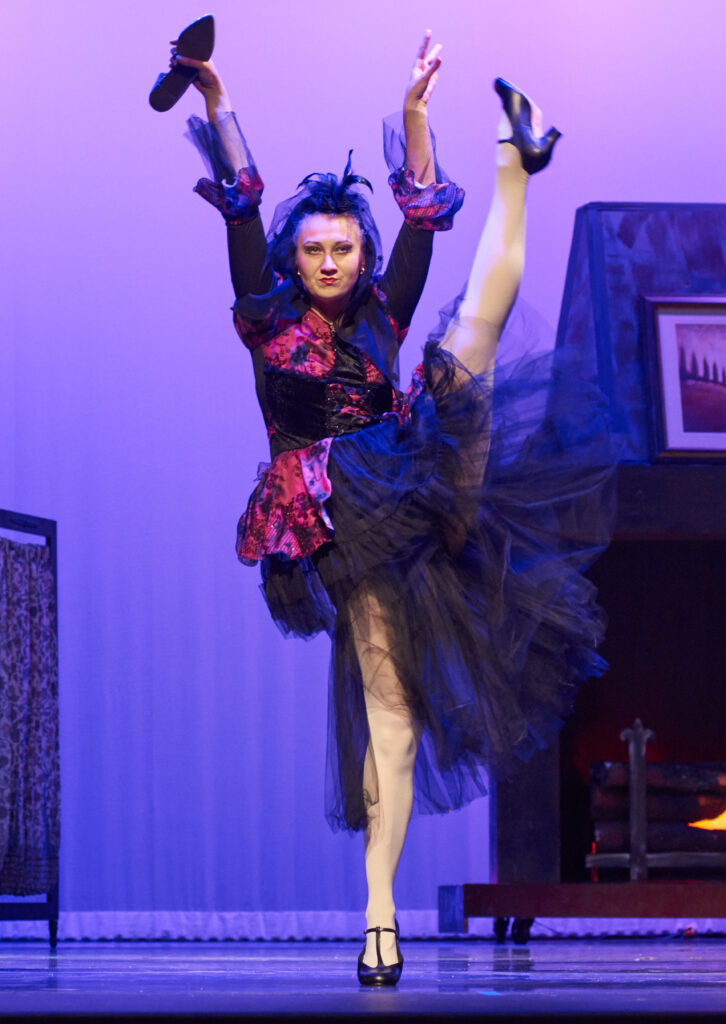
Kocherga developed her love of dance as a child at her mother’s dance studio in Ukraine. When she was 15, her family moved to Charlotte, and she continued dancing professionally. Soon after, she tore her ACL, making her dream of a professional career as a dancer more difficult.
After finishing high school at age 16, she enrolled at Central Piedmont Community College. There she met chemistry instructor Michelle Esancy, and with Esancy’s encouragement, she began to see a career in STEM as an option. As she prepared to transfer to UNC Charlotte for her junior year, she found a place in Daniel Rabinovich’s chemistry lab. Soon after, she was chosen for the intensive Charlotte Research Scholars undergraduate experience, researching the toxicity of mercury in biological systems. Those experiences inspired her to pursue her doctoral degree and deepen her research. She has also continued to support CRS, working with undergraduates who have come behind her.
“One main thing I’ve learned from my mentors is to always try things,” she says. “Don’t be closed-minded. Don’t be afraid to try things you don’t know. Always have an open mind, and listen to others. That’s something I have learned – listen to everything and everybody, and then decide what’s the best for you. You can’t confine yourself to a box. You have to go out there and explore.”
Words and Images: Lynn Roberson
CLAS Teaching Excellence Honorees Use Interactive Methods to Engage Students
The three recipients of this year’s College of Liberal Arts & Sciences’ Excellence in Teaching Awards find innovative ways to challenge and engage students, including research opportunities, interactive lectures, and real-time projects.
In recognition of their exceptional teaching, Jennifer Munroe, Sarah Pollock and Lane Rhodes have received the Excellence in Teaching Awards for the 2018-2019 academic year.
Munroe, a professor of English, has received the Integration of Undergraduate Teaching and Research Award. Pollock, a lecturer in the Department of Sociology, has received the Award for Outstanding Teaching by a Full-Time Lecturer. Rhodes, an adjunct faculty member in the Department of English, has received the Award for Outstanding Teaching by a Part-Time Faculty Member. They received their awards at a college celebration on April 22 in the Halton Reading Room in J. Murrey Atkins Library.
Integration of Undergraduate Teaching and Research Award
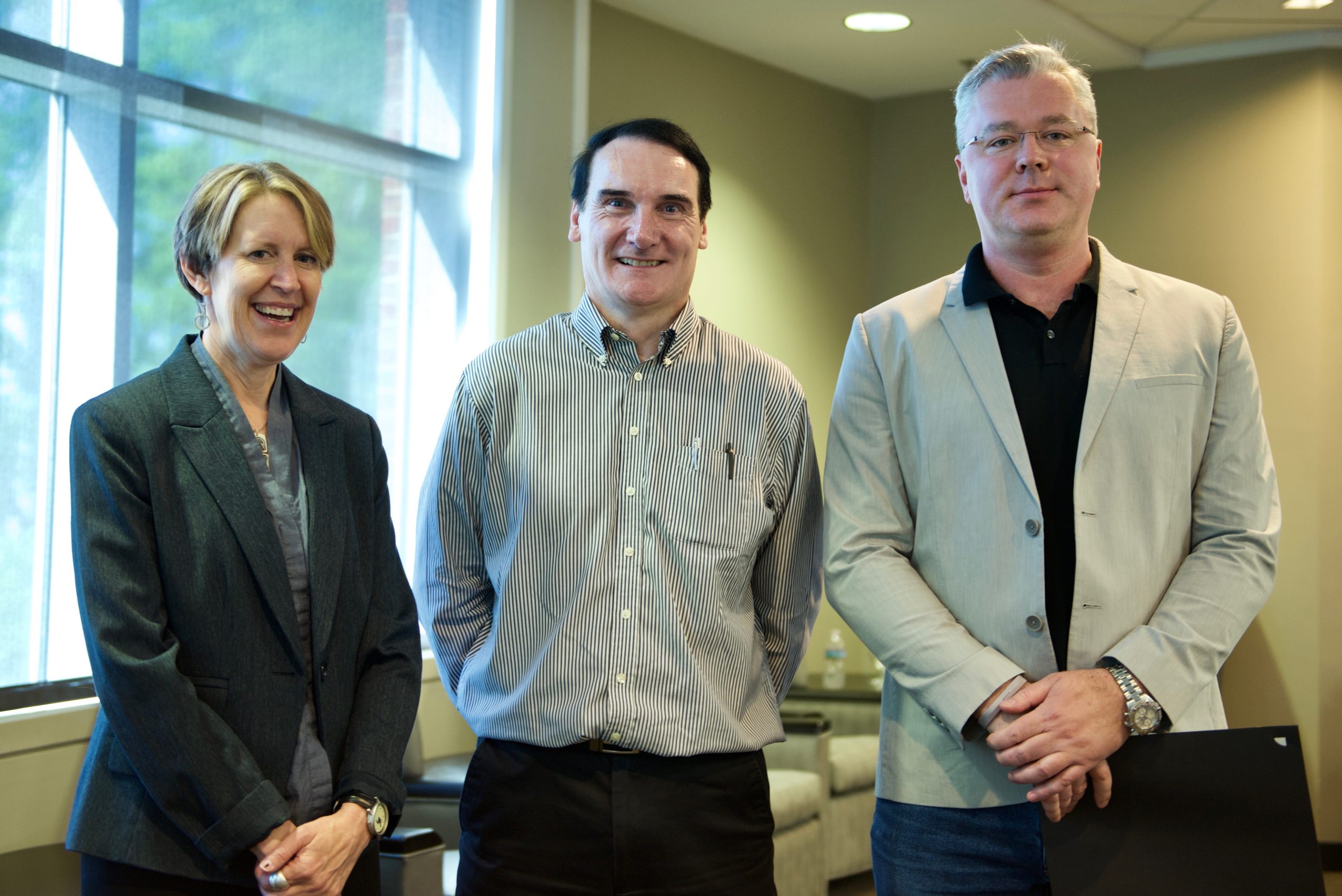
Since her arrival at UNC Charlotte in 2004, Munroe, who was chosen to receive the award, has built an impressive research record in the areas of Shakespeare studies, early modern literature, and eco-criticism, including several monographs and essay collections. She has taught undergraduate and graduate courses on these topics for English, Liberal Studies, the Honors Program and Women’s and Gender Studies. Munroe’s scholarly investment in ecofeminism and ecological literary studies shape her approach to teaching and the content of her courses at all levels.
“I approach what happens in my classroom (and out) not simply as related to my research; my research stems from a curiosity that I have about ecological and literary questions that I aim to help my students find their own way of asking,” Munroe says. “And in so doing, my students literally become active researchers and co-producers of knowledge in their own right.”
In particular, she has involved her students in research that led to a co-authored book, Shakespeare and Ecofeminist Theory, with Rebecca Laroche, and to an ongoing digital humanities initiative dedicated to the creation of a public-access database of early modern manuscript recipes in partnership with the Folger Shakespeare Library. She has taken her advanced class students there to workshops related to her courses and to conduct their own original archival research.
This exposure to research has led her students to start an official campus organization, the Early Modern Paleography Society (EMPS), now in its fourth year, dedicated to the transcription and study of early modern manuscript recipes and the study of early modern women’s and ecological history. It has also opened doors for some of her students at top graduate institutions in the United States and internationally.
“It is her ability to spark enthusiasm in her students while building a research tool that will revitalize the field that makes Dr. Munroe’s teaching so transformative,” says Hillary Nunn, a professor of English at the University of Akron and a colleague of Munroe’s on the steering committee of the Early Modern Recipes Online Collective. “I cannot think of a scholar who better exemplifies the benefits – to students and to the field more broadly – of involving undergraduates in cutting edge research.”
Finalists for the Integration of Undergraduate Teaching and Research Award were Kirill Afonin, an associate professor in the Department of Chemistry and Didier Dréau, an associate professor in the Department of Biological Sciences.
Dréau has taught a wide range of courses at the undergraduate and graduate levels. Many of his courses feature hands-on training of undergraduate students within laboratory settings. Much of his own research, and his laboratory experiences, are highly productive and externally funded, with him generating $1.7 million in funding. His research, which has resulted in more than 60 peer-reviewed publications, is described as inter-disciplinary, consistent, impactful, and impressive.
Chemistry Department Chair Bernadette Donovan-Merkert describes Afonin as one of UNC Charlotte’s top researchers. “He is also an effective mentor for students in his research group, and he has developed an innovative course that truly engages students in research and the generation of new knowledge,” Donovan-Merkert says. “Kirill sets the bar for the integration of cutting-edge research and undergraduate education.”
Award for Outstanding Teaching by a Full-Time Lecturer
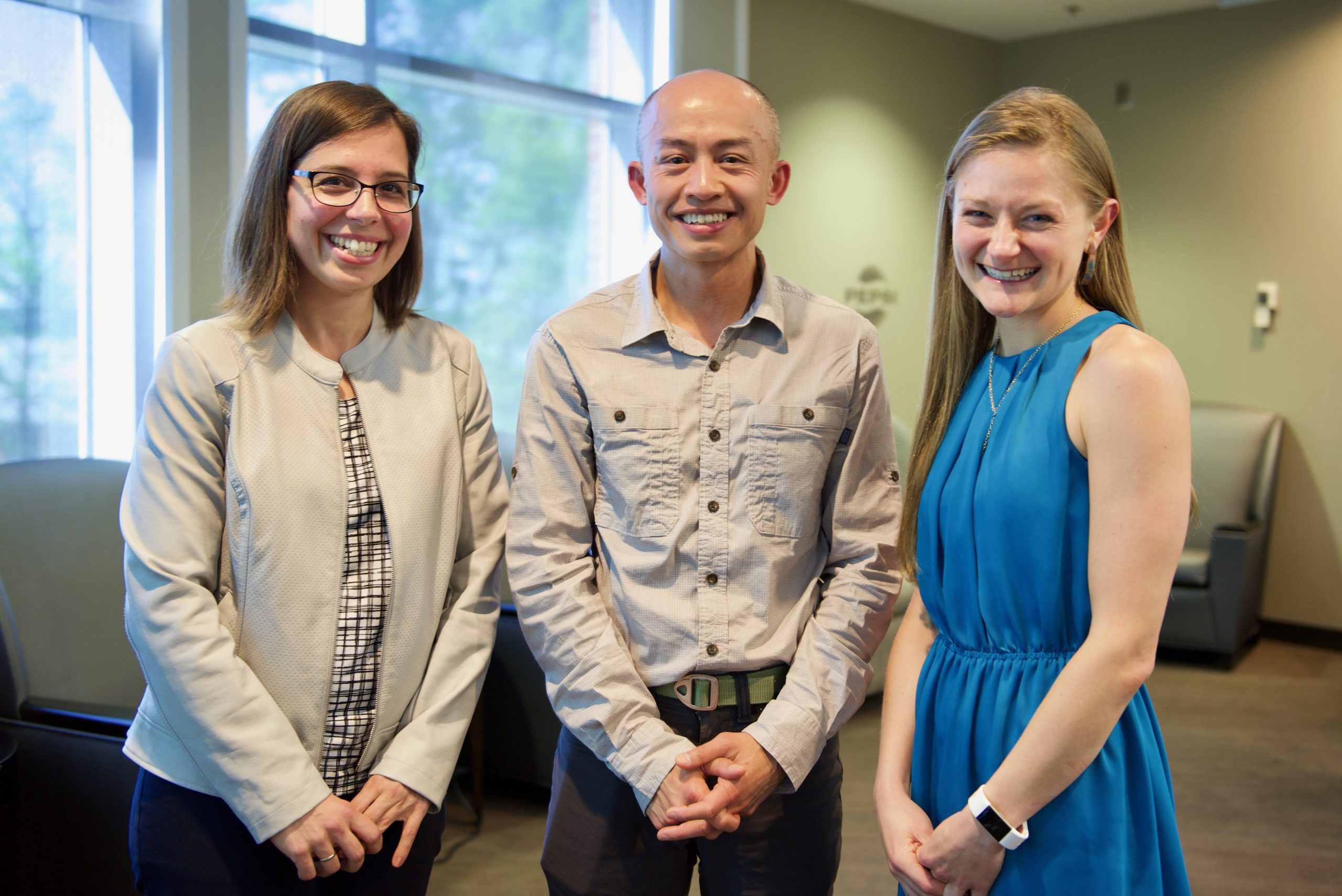
Sarah Pollock, who was chosen to receive the award, joined the faculty as a full-time lecturer in the Department of Sociology in fall 2015. She teaches sociology courses that address gender, human sexuality, as well as quantitative analysis. Pollock says she thinks that “…teaching is more than helping students learn the material; it’s about developing their critical thinking skills, broadening their perspectives, and challenging them to grow intellectually, morally, and socially.”
Pollock’s peers and Sociology Department chair Stephanie Moller commend Pollock for her effective teaching.
“Dr. Pollock is in her fourth year on the UNC Charlotte faculty, and she has already left a lasting mark on the department and student culture,” Moller says. “She is clearly committed to helping our students become thoughtful and critical sociologists. Dr. Pollock is dedicated to finding innovative strategies to reach her students and keep them engaged, and she is willing to reflect on those strategies to assess what does and does not work.”
Pollock uses innovative and effective strategies in the classroom that keep her students engaged. Her teaching style pushes students through the stages of learning.
As one example, Pollock revised one of her courses to further develop students’ reading comprehension skills, moving away from reading notes to journal assignments. The new approach enables students to come to class better prepared. They can focus on the main arguments of the readings, and can cultivate their ability to synthesize and apply what they are learning. Class discussions are more nuanced and productive, and students’ depth of understanding has improved, as shown by essay questions.
As faculty advisor to the Student Association of Sociology (SAS) and Alpha Kappa Delta and director of the Transfer Student Learning Community, Pollock mentors the student leaders for these organizations, guiding them as they plan professional development workshops, study sessions, volunteer opportunities, fundraising, and critically-engaged movie nights. She has organized and accompanied groups of undergraduate sociology students to the annual meetings of the Southern Sociological Society.
Pollock also supports the broader teaching mission of the Department of Sociology, such as by revamping the laboratory assignments for faculty across the department to use with their quantitative methods courses.
Finalists for the Award for Outstanding Teaching by a Full-Time Lecturer were Tuan Cao, a full-time lecturer in the Biology Department, and Paloma Fernandez Sanchez, a full-time Spanish lecturer in the Department of Languages and Cultural Studies.
Cao is described as an innovative and dedicated teacher. In one class, he has students volunteer with community organizations to apply their biological knowledge in real-life situations and gain a commitment to outreach and service to others. Since 2016, students have contributed almost 3,000 hours of service to nonprofit organizations such as Catawba Riverkeeper Foundation, Carolina Raptor Center and TreesCharlotte.
Three key components of Sanchez’s teaching philosophy include connecting the course’s student learning objectives with her student’s own professional goals, emphasizing the importance of diversity and inclusion through her lectures and classroom activities, and establishing a collaborative and active learning environment. She says that learning another language helps students embrace the importance of sociopolitical and cultural perceptions that are part of other communities as well as their own.
Award for Outstanding Teaching by a Part-Time Faculty Member
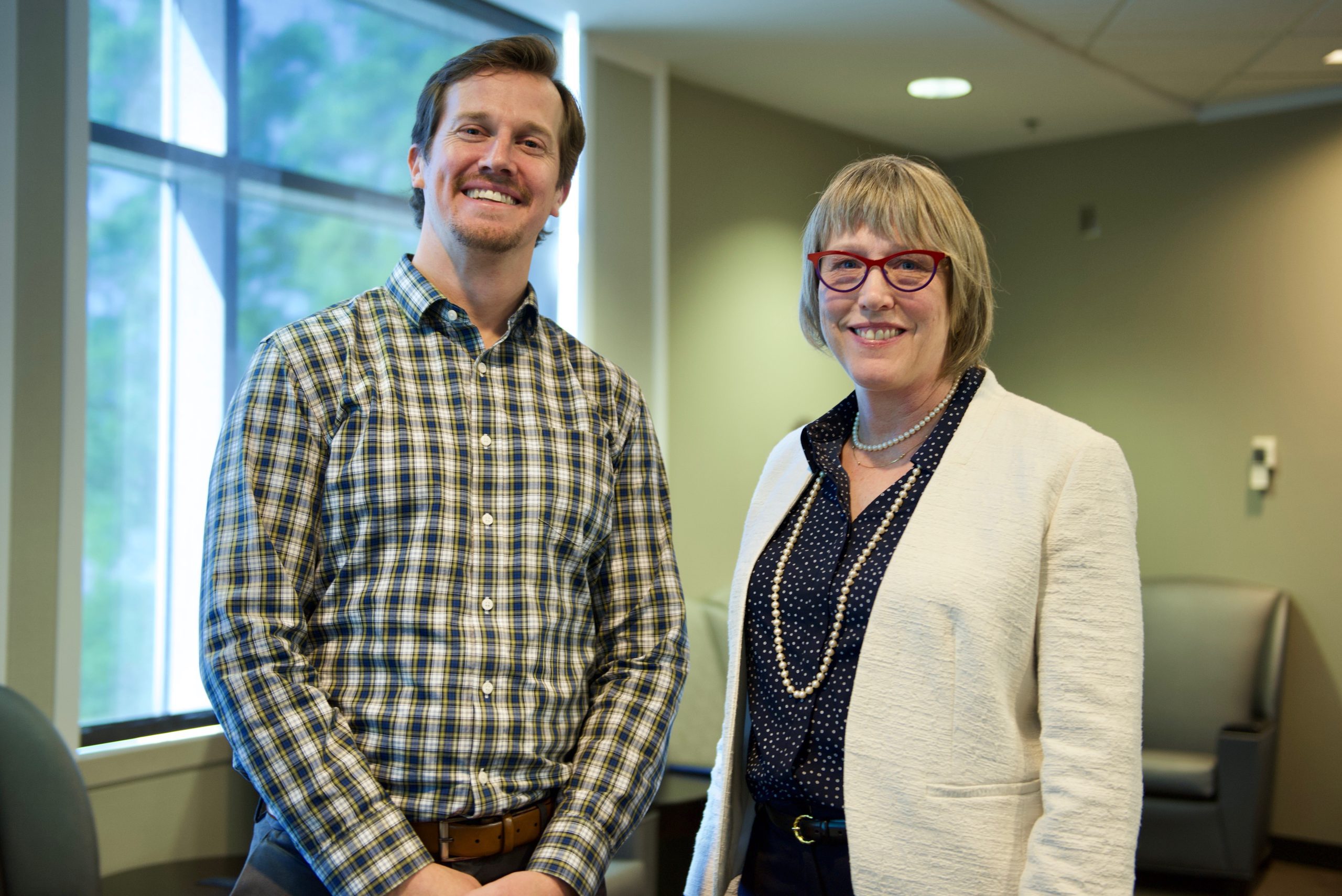
Lane Rhodes, who was chosen to the receive the award, has worked as an adjunct lecturer in the Department of English since spring 2016. She teaches the Introduction to Technical Communication course most frequently, and she also teaches a liberal studies course with the theme of literature and culture and an American Studies Program course that focuses on protest music throughout American history. Rhodes earned her master’s degree in English from UNC Charlotte and her bachelor’s degree in piano performance from UNC Chapel Hill.
She spent close to 25 years working in development and communications work in a variety of professional environments and draws on this background to help students grasp how class assignments relate to real-life work situations. “I want students to be confident that what we work on in class matters, is relevant, and will increase their awareness and success beyond the university experience,” she says.
Rhodes has worked in collaboration with other UNC Charlotte units, such as J. Murrey Atkins Library, to facilitate a professional video conference session to bring experts from different industries into the classroom. Working with the university’s Recycling Office, her students created education posters, brochures, surveys, and presentation materials related to a real-time recycling project.
“Students know the first day of any semester that my classroom constitutes a community of mutual respect (and that) we will all support each other’s success,” Rhodes says. “I am there to guide and facilitate student-centered learning; that model requires that all participants be responsible for learning.”
In one of her classes, a literature and culture course, she focuses on the connections between literature and music. She has her students in this course read stories and novels about musicians and helps them understand the connection between music and storytelling. Her experience in teaching this course has led her to develop and teach an American Studies course on protest music throughout American literature.
“The broadest foundation of my teaching philosophy is the notion that all of life IS interdisciplinary, and in every class, I stress the importance of connecting seemingly disparate ideas,” she says.
The finalist for the Award for Outstanding Teaching by a Part-Time Faculty Member is Andrew Goff, an adjunct lecturer in the Department of Biological Sciences. Goff believes that creating a lasting impression is vital for cultivating a learning environment. He promotes an open, discussion-based format in his lectures and uses polling and response-type activities to gauge their understanding and retention of the material. He also invites students to join him for creek cleanups in and around local creeks, making connections with them outside the classroom.
Teaching Professor
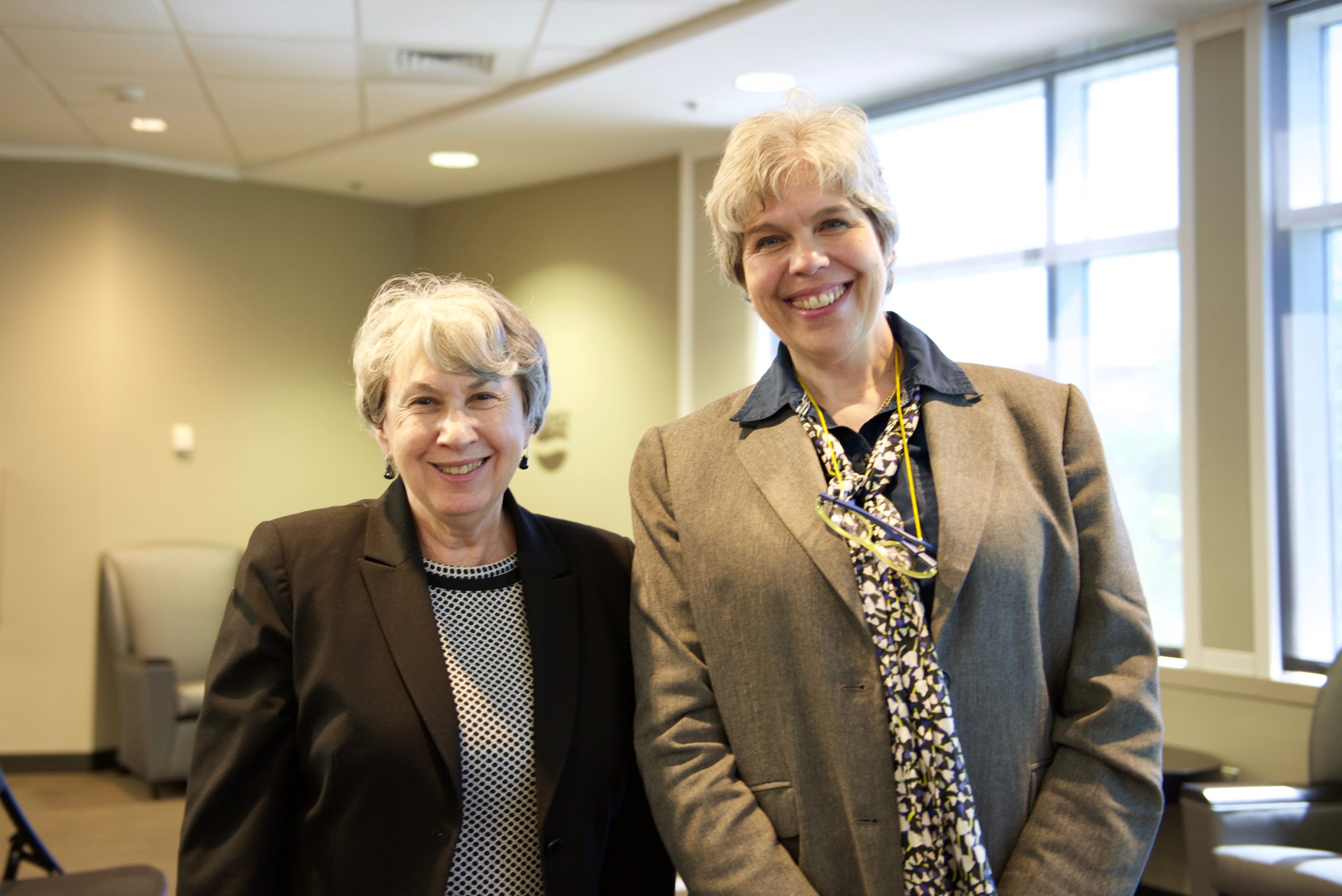
Also at the ceremony, Daniela Cunico Dal Pra, a lecturer in Italian in the Department of Languages and Culture Studies, was recognized for her selection as a Teaching Professor in the College. The title “Teaching Professor” is awarded to an outstanding lecturer or senior lecturer in recognition of extraordinary accomplishments in teaching and fundamental contributions to the university’s educational mission.
Top photo: Award recipients Jennifer Munroe (from left), Lane Rhodes, and Sarah Pollock celebrate with Dean Nancy Gutierrez.
Words: Mary Ellen Frizzell and Banita Brown | Images: Lynn Roberson
Mathematics and Statistics Faculty Earn Coveted NSF CAREER Awards
Two faculty members in the Department of Mathematics and Statistics, Xingjie (Helen) Li and Kevin McGoff, have each received a Faculty Early Career Development (CAREER) award from the National Science Foundation.
CAREER awards are among the most prestigious in support of early-career faculty. The CAREER Program supports faculty who have the potential to serve as academic role models in research and education and to lead advances in the mission of their organizations.
With her five-year funding, which is expected to total $400,000, Li will focus on the development of a new and quantitative coupling framework for defective 2D systems. The wide range of properties from 2D materials pose a unique challenge for mathematical modeling and computation. The overarching goal of this project is to develop constitutive mathematical models and corresponding high order numerical schemes for the deformation of 2D materials with provable performance.
Li’s work will provide research opportunities for graduate and undergraduate students. She also plans to initiative a new Society for Industrial and Applied Mathematics /Association for Women In Mathematics chapter and organize departmental colloquium for students. She will organize an outreach program for science and mathematics education annually in the Carolina region, and she plans to organize an AWM Research Symposium.
Learn more about Li’s research here.
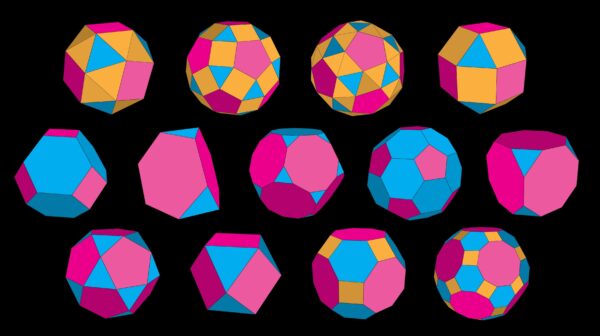
With his five-year funding, which is anticipated to total $419,367, McGoff will analyze dynamical systems, specifically addressing the two interrelated questions of how typical dynamical systems behave, and what can be learned from observations of a dynamical system or group action. The theoretical tools produced by this research will be of broad use in informing the inferential methodology in fields such asgeometric morphometrics, shape analysis, and systems biology and could therefore advance understanding of important biological processes.
In addition to the research outcomes, McGoff’s project is expected to contribute to the education of students ranging from middle school to university graduate level. He will work with students from the Pre-College STEM Program at the UNC Charlotte Center for STEM Education. Additionally, the K-12 engagement activities will be disseminated to teachers through workshops and professional development.
Learn more about McGoff’s Research here.

Words and Images: Lynn Roberson | Illustrations: Ashley Plyler | Top Image: McGoff (left) and Li.
UNC Charlotte, Gaston College, Rowan-Cabarrus Community College Grow Collaboration, With NIH Support
A new collaborative effort called the Bridges to Baccalaureate Program is designed to help students at UNC Charlotte, Gaston College, and Rowan-Cabarrus Community College complete undergraduate biomedical degrees and, ultimately, succeed in biomedical careers.
The initiative is made possible through support from the National Institutes of Health, with funding expected to total $1.37 million over five years. The program will work with a total of 45 students who will earn their associate degrees at Gaston College or Rowan-Cabarrus Community College before transferring to UNC Charlotte to complete their bachelor’s of science degrees in the biomedical sciences.
The program builds upon a strong existing partnership among the three campuses, which in spring 2018 announced funding from the National Science Foundation for the SPARC4, or STEM Persistence and Retention via Curricula, Centralization, Cohorts, and Collaboration Project.
“It is exciting to further the work we are doing together,” said Bridges to Baccalaureate Program Director Christine Richardson, who is a professor in the Department of Biological Sciences at UNC Charlotte. “Students who enter college with aspirations for biomedical careers sometimes lack the understanding of, and preparation for, the processes of science. Working together, we want to address the gaps so students can succeed.”
The three partners anticipate sharing educational best practices that have been developed or improved during the two projects. While they are not the same, the projects will complement each other.
“We are thrilled to once again partner with UNC Charlotte in a program that will benefit STEM students,” said Ashley Hagler, who is the SPARC director, as well as director of undergraduate research/biology coordinator, at Gaston College. “This is an excellent opportunity for students who are interested in biomedical sciences to explore a career in research, and to experience a one-on-one mentoring relationship with a faculty member at Gaston before they transfer to UNC Charlotte.”
Students To Gain Access To Resources
The Bridges to Baccalaureate Program will focus on exposing students to targeted resources and experiences.
“This grant gives our students an exciting opportunity to get real world research experience. This experience will not only help students support themselves financially, but it will also give them a unique relationship with faculty in a lab setting. Students will quickly learn if a biomedical career is for them,” said Dr. Carol Scherczinger, dean of arts and sciences at Rowan-Cabarrus Community College.
The partnership includes three areas of emphasis, following what is commonly called a Guided Pathway to Success model.
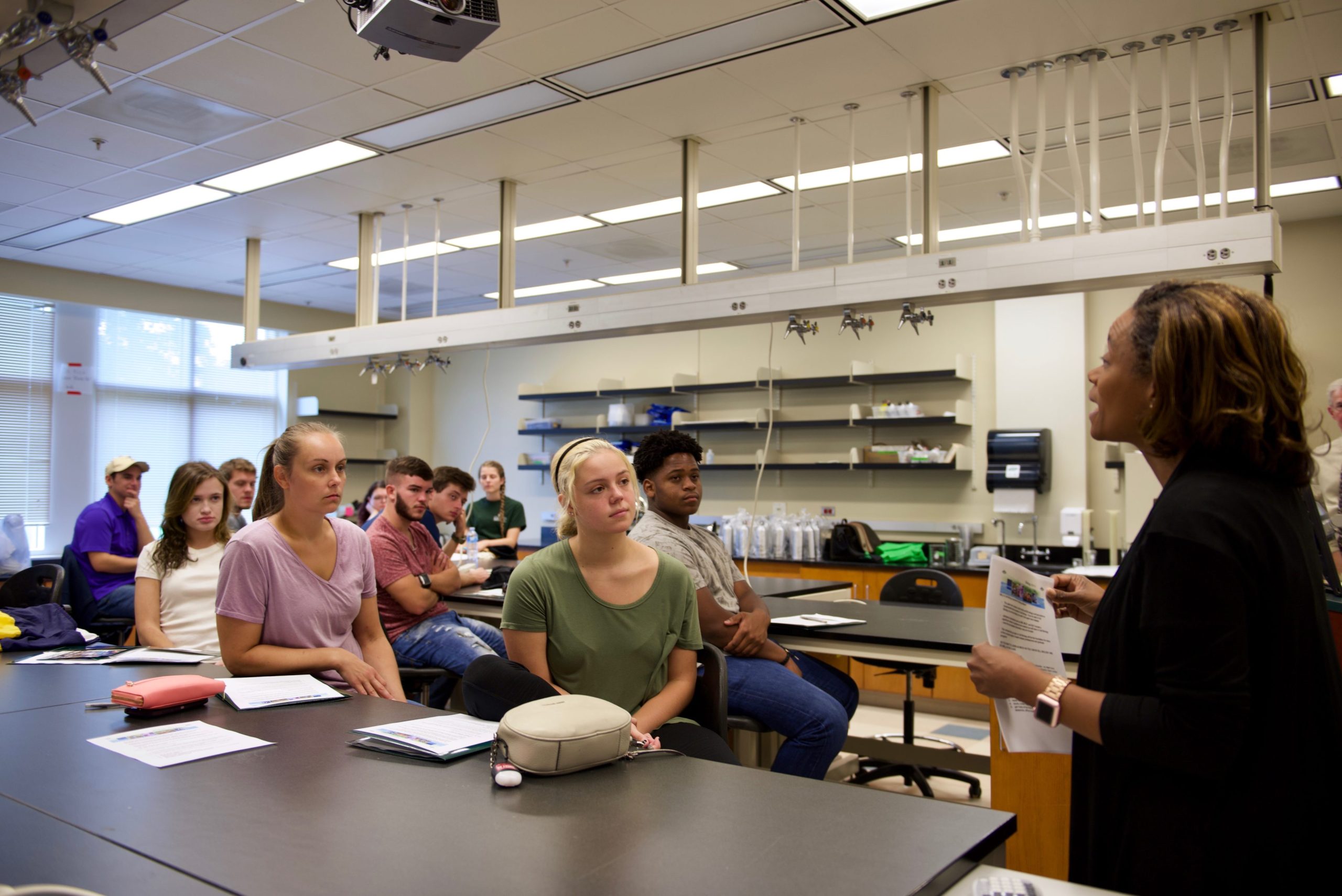
Gaston College students visit UNC Charlotte Biological Sciences labs to build relationships and learn about classes.
First, students will receive intensive academic advising while using “degree maps” to help them chart their academic course. They also will experience individualized mentorship, cohort learning, and embedded course tutoring at the community college and university institutions.
Second, students will conduct independent research projects with faculty at the community college and later at UNC Charlotte. Research at UNC Charlotte will include both summer and academic term independent research in a laboratory, conducting cutting-edge biomedical sciences research. These experiences will culminate in poster and oral presentations both on campus and at national scientific meetings as well as opportunities to publish in peer-reviewed journals.
Third, to promote a sense of inclusion and understanding of how biomedical sciences fit in the broader community context, transfer students will be paired with senior student mentors at the university level, attend regional networking events for biomedical professionals, participate in professional development workshops, and take courses in bioethics.
Recruitment of students will include a focus on increasing the numbers of students from underrepresented groups in STEM into the biological and biomedical sciences majors. These would consist of underrepresented ethnic and racial groups, women, people with disabilities, and those from rural areas with low incomes.
Partnership To Add To Broader Discussion
The regional project is expected to contribute to the nationwide conversation around the issue of what helps – or hinders – community college students as they strive for careers in STEM fields, particularly in the life sciences. Each year, UNC Charlotte welcomes more community college transfers than any other North Carolina college or university.
Collaborators at each institution include faculty from diverse disciplines, as well as institutional leadership. At UNC Charlotte partners include the College of Liberal Arts & Sciences, the College of Health and Human Services, J. Murrey Atkins Library, and the University Transfer Center, which is a resource for transfer students. Faculty participants and lab resources also come from other colleges, including the Lee College of Engineering and the College of Computing and Informatics.
Research reported in this publication was supported by the National Institute Of General Medical Sciences of the National Institutes of Health under Award Number R25GM128571. The content is solely the responsibility of the authors and does not necessarily represent the official views of the National Institutes of Health.
Words and Images: Lynn Roberson, CLAS Communications Director | Images show SPARC4 students from Gaston College visiting UNC Charlotte Biological Sciences labs.
Vivero-Escoto Lab Receives NSF Funding to Continue Cancer Research
To further research efforts in improving delivery and impact of cancer treatments through nanoscale science, the lab of Juan Vivero-Escoto, associate professor of chemistry, has received $100,000 in funding from the National Science Foundation.
Vivero-Escoto’s research focus is on developing biodegradable nanoparticles that can deliver higher, longer-lasting doses of treatment to cancer cells, then break down and dissipate without the harsh side effects commonly associated with cancer treatments.
“Our team is testing the use of silica particles that stay in the body longer and deliver drugs to a tumor more effectively,” Vivero-Escoto said. “A principal challenge is finding the right combination of these materials that will degrade quickly enough to prevent them from becoming toxic.”
The research project, “Biodegradable Hybrid Nanoparticles Containing Photosensitizing Agents,” is a continuation of a joint project with researchers in Brazil that started in 2016 with support from UNC Charlotte’s Graduate School and the State of São Paulo Research Foundation. The program, called SPRINT (São Paulo Researchers in International Collaboration), provides opportunities for faculty from the two countries to form research partnerships.
“The SPRINT program has been instrumental to the progress of this research,” Vivero-Escoto said. “Our collaboration with our colleagues in Brazil has been quite productive.”
The latest round of funding comes from the NSF’s EAGER program (Early-Concept Grants for Exploratory Research), designed to enable research projects that focus on ideas that are more risky, yet offer what the NSF calls potentially transformative breakthroughs.
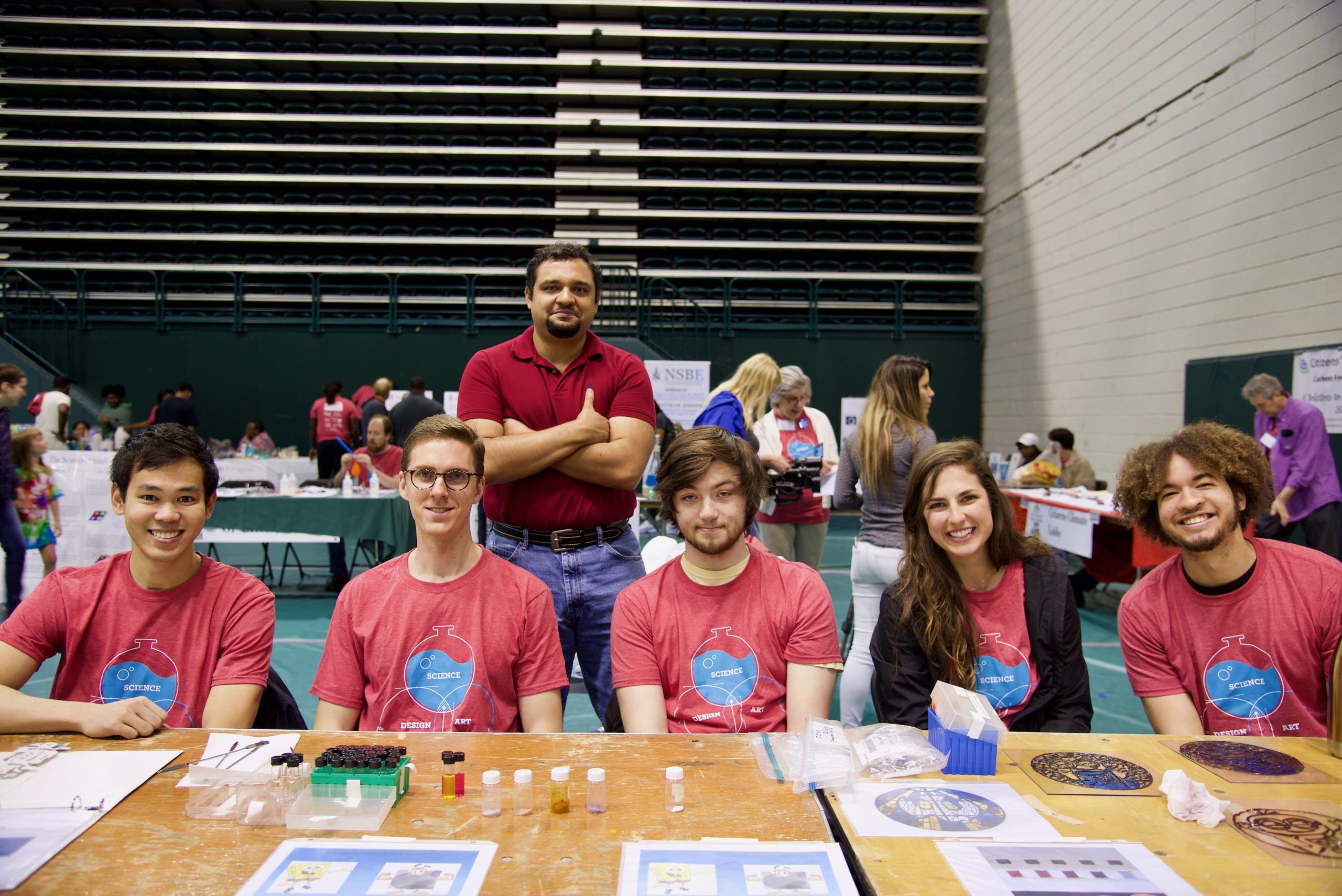
Juan Luis Vivero-Escoto (standing) and his students volunteer at the UNC Charlotte Science and Technology Expo.
In addition to its focus on cutting-edge research, Vivero-Escoto’s team spends time sharing the joys and challenges of research with students in traditionally underrepresented, primarily minority communities. The professor and his students work regularly with Charlotte-area students from kindergarten through high school, delivering presentations, workshops and experimentation to expose more young people to nanoscale science and assure them that becoming a scientist is within their grasp.
“Our duty as researchers is not only to promote research and education,” Vivero-Escoto said, “but to be a role model for future generations. The U.S. must grow the number of people with knowledge of nanoscience in our workforce to compete worldwide.”
Words: Courtesy of The Graduate School at UNC Charlotte | Images: Lynn Roberson, CLAS Communications Director
Doctoral Student Studies Soybean To Address Poverty, Hunger Issues
Keeping her native land of Bangladesh close to her heart, Farida Yasmin has come to UNC Charlotte to research the woes of the soybean, which, as a critical global resource, provides more than half of the world’s vegetable oils and proteins.
Yasmin is seeking ways to improve the plant’s resistance to the most devastating pest affecting the soybean worldwide – the soybean cyst nematode, a small plant-parasitic roundworm. Her ultimate goal is to help alleviate hunger and poverty in her home country and worldwide, and to inspire women and girls to pursue STEM careers. She is conducting research as a doctoral student in Bao-Hua Song’s lab in the Department of Biological Sciences.
“I have always appreciated how people in my home country are so dependent upon agriculture for their livelihood,” Yasmin said. “As a granddaughter of an agricultural investor, I have observed very closely how a majority of the people who are dependent upon agricultural sectors are facing challenges.”
Issues include high infestations of insects and diseases that are resistant to current and often expensive pesticides; competition among crops for scarce resources, such as water and nutrients; and other problems, including the impact of climate change. Agriculture is the most important sector of Bangladeshi economy, affecting employment, financial security, and access to food.
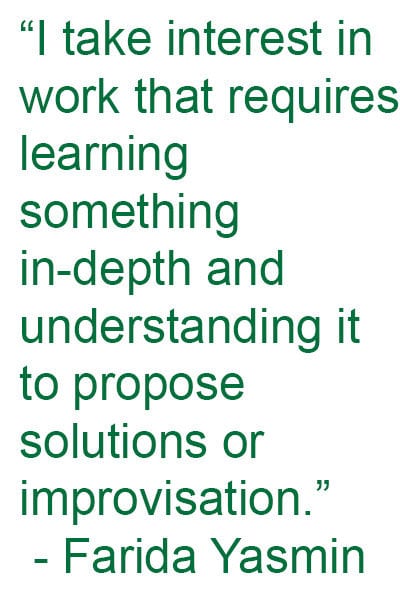 “A question always goes through my mind. How could this problem be addressed? How could I contribute my knowledge to improve the status of this agricultural sector? I am passionate about learning. I take interest in work that requires learning something in-depth and understanding it to propose solutions or improvisation,” she said.
“A question always goes through my mind. How could this problem be addressed? How could I contribute my knowledge to improve the status of this agricultural sector? I am passionate about learning. I take interest in work that requires learning something in-depth and understanding it to propose solutions or improvisation,” she said.
Funding from the Schlumberger Foundation, through its prestigious Faculty for the Future Fellows program, is supporting Yasmin’s research, up to $50,000 a year. She and other fellows are expected to return to their home countries after their studies, to contribute to economic, social and technological advancement by strengthening the STEM teaching and research faculties of their home institutions, and to pursue positions in the public sector where their newly acquired technical and scientific skills can help provide evidence-based support for STEM policymaking.
By becoming part of the Song lab, Yasmin has joined a research team that focuses on understanding molecular mechanisms and the evolution of plant biotic and abiotic stress response, using crop wild relatives as study systems. Song and her lab team apply their research in real world problems, such as crop improvement and human health.
“I am very impressed by Farida’s positive attitude and strong motivation, as well as the clear goal that she has in mind,” Song said. “Farida plans to learn cutting-edge omics technology in crop improvement during her graduate studies at UNC Charlotte. She then plans to returns to her home country to help solve agriculture problems and promote women’s education in science. I believe she will be an excellent role model for girls and women in STEM back in her home country, and also while she is here at UNC Charlotte. I am also confident that Farida will play an important role in bridging international collaboration in agriculture research.”
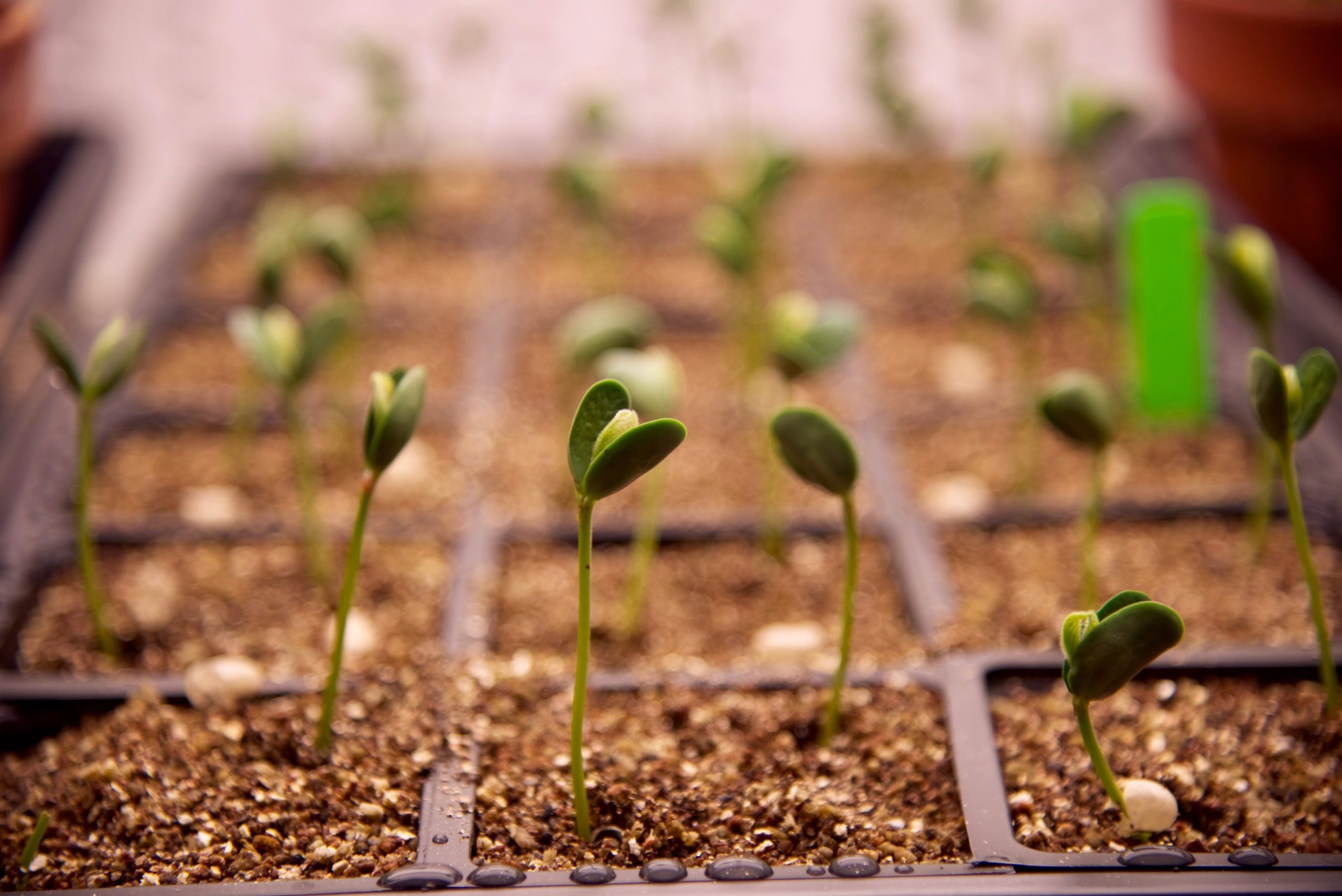 Scientific advances in whole genome sequencing, combined with “omics” technologies, have improved life science research, including with the soybean. Omics include genomics, transcriptome (a collection of all the gene expressions in a cell or an organism), metabolomics, and proteomics. Scientists analyze and mine soybean genomics data as they seek better understanding of how plant traits are regulated. This knowledge will influence plant breeding, with resistance to pests and other stresses in mind.
Scientific advances in whole genome sequencing, combined with “omics” technologies, have improved life science research, including with the soybean. Omics include genomics, transcriptome (a collection of all the gene expressions in a cell or an organism), metabolomics, and proteomics. Scientists analyze and mine soybean genomics data as they seek better understanding of how plant traits are regulated. This knowledge will influence plant breeding, with resistance to pests and other stresses in mind.
Yasmin is optimistic that her work will contribute to solutions to help address the economic impact of these pests worldwide. She also hopes to influence policy decisions in Bangladesh, and to inspire girls and women to pursue careers in STEM.
“I am trying to reach every corner of my country to promote science,” she said.
Words: Cooper Schroeder, CLAS Student Communications Assistant | Images: Lynn Roberson, CLAS Communications Director | Top Image: Farida Yasmin (left), with Bao-Hua Song in The Song Lab.